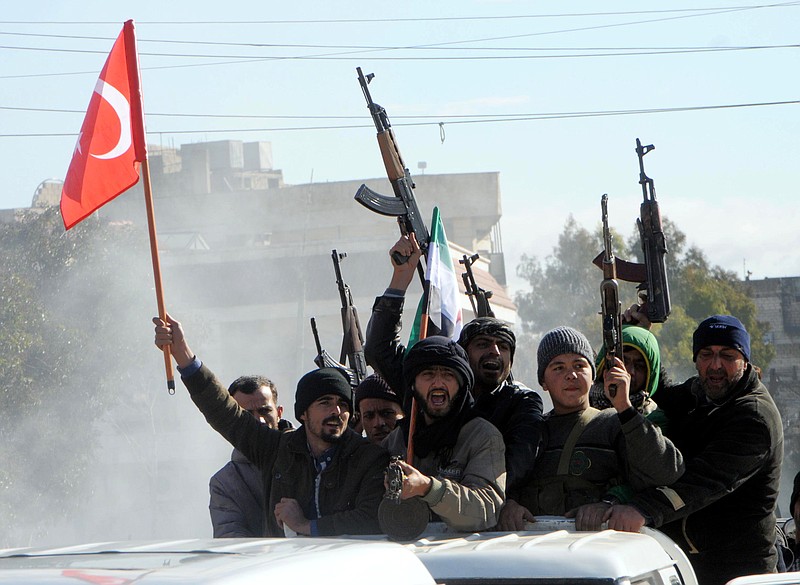BEIRUT (AP) - As Turkey threatens a bloody confrontation with a U.S.-backed Kurdish militia in the main Syrian Kurdish enclave in northwestern Syria, it faces the challenge of maintaining its old alliance with Washington and reinforcing a new rapprochement with Moscow.
The move comes as Syria once again finds itself on the precipice of a new conflict, after months of reduced violence and a surge in post-war stabilization plans. Meanwhile, tens of thousands of Syrians in the northwest are fleeing the renewed violence amid a new government offensive in neighboring Idlib, converging on the Turkish border and igniting fears of a new wave of migration.
Turkey's defense minister, Nurettin Canikli, said Friday there was no turning back from launching a ground assault on Syria's Afrin enclave, saying the offensive had "de facto" started with sporadic Turkish military shelling of the area. Over the last week, Turkey sent troops and tanks to the border and rallied Syrian fighters it has backed for the fight against Afrin's battle-hardened Kurdish fighters, estimated at between 8,000 and 10,000.
The operation could spill into a wider Turkish-Kurdish confrontation inside Turkey. It also threatens to turn into a humanitarian disaster. The Afrin district houses no less than 800,000 civilians, including displaced people from earlier years of the Syrian war.
Turkey has been preparing for a showdown in Afrin for a while. But the recent escalation coincides with U.S. announcements it is creating a new 30,000-strong Kurdish-led border force to secure the frontiers of Kurdish-controlled areas, including with Turkey and Iraq, to prevent the resurgence of Islamic State militants.
Moscow's green light is necessary for a Turkish operation into Afrin, where Russian military observers have deployed since last year to prevent such a confrontation.
Activists and Kurdish fighters denied claims in Turkish media that Russian troops have begun a withdrawal.
Russia, Iran and Turkey are interested in limiting the U.S. presence in Syria, and have protested Washington's plans to create the border force, viewed as a U.S. attempt to create a buffer zone where Iranian and Syrian government influence ends.
Ankara's military operations in Syria began in 2016 in large part to curtail the formation of a contiguous territory under Kurdish control along its borders. It successfully severed territorial continuity when it deployed its troops and proxy Syrian fighters to areas between Kurdish enclaves in eastern and western Syria.
Afrin remained the only Kurdish enclave in northwestern Syria, encircled by Turkey-backed rebels, and Turkey has been preparing an assault for over a year. Turkey claims Afrin is an operating base for fighters of its own outlawed Kurdish insurgent group, the Kurdistan Workers' Party, or PKK, to infiltrate Turkish territories.
In dealing with the conflicts in Afrin and Idlib, Turkish President Recep Tayyip Erdogan has shown political acumen, juggling national security interests and domestic election concerns, while exerting pressure on Washington and Moscow for his long-term strategic objectives. The threats of an offensive against Kurdish fighters help consolidate nationalist support for Erdogan, who faces a crucial election next year.
With an assault on Afrin, Turkey seeks to further undermine the Kurdish dream of federalized rule in northern Syria. Driving the Kurdish militia out of Afrin would also allow Turkey-backed Syrian fighters supporting its offensive to link Idlib to Syria's largest city, Aleppo.
Turkey deployed troops in November in Idlib to monitor a de-escalation agreement with Russia and Iran, but they were more strategically stationed along the border with Afrin.
The timing reflects Turkey's increased frustration with U.S. support for Kurdish forces in Syria, who are now in control of nearly 25 percent of the country, in areas which straddle the Turkish and Iraqi border.
"Turkey remains a loyal and trusted friend and ally of the U.S. and the West. But that does not mean we will accept being treated as sacrificial animals just because a couple of American generals want to embark on an adventure in the Middle East," Ilnur Cevik, an Erdogan presidential adviser, wrote in the Turkish daily Sabah.
Despite assurances to Turkey from State Secretary Rex Tillerson, who said the Kurdish-led border force has been misrepresented, there doesn't seem to be a major shift in U.S. policy in Syria.

